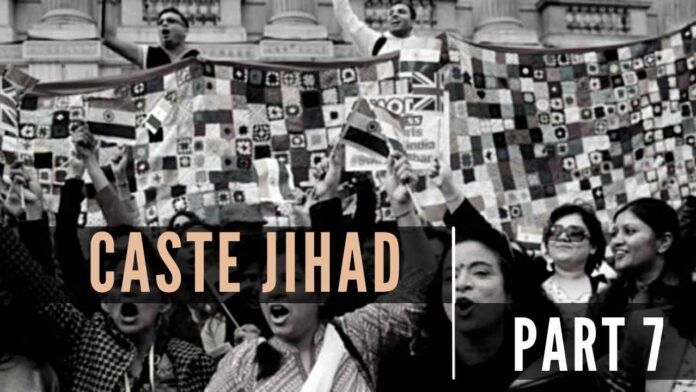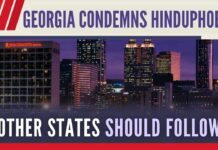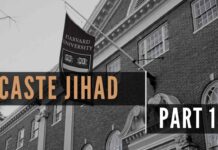
The previous 6 parts of the article can be accessed here Part 1, Part 2, Part 3, Part 4, Part 5, Part 6. This is the seventh part
Alleged caste discrimination in non-high-tech areas in the U.S.
The last part of this series was an overview of how the caste issue has emerged in the United States. The most vocal activist raising awareness and fighting to protect the rights of Dalits from South Asia has been the Equality Labs. First of all, we condemn any form of discrimination anywhere yet there are many reported cases which under Title VII which prohibit employment discrimination based on race, color, religion, sex, and national origin. While the caste is not an explicitly protected category under Title VII, a few cases discussed below have approached the complaint that the caste is a part of the race, color, and/ or national origin.
Here, we discuss alleged caste-based discrimination in academia, restaurant, and involving a large temple conglomerate. The allegations of caste-based discrimination in the high-tech industry will be a topic in the next article because that is the most consequential for tens of thousands of people of Indian origin (and South Asians). Some cases below are complex to include human trafficking and violation of immigration laws involving Dalit and/ or lower caste in India but not explicit caste-based discrimination in employment.
University:
The earliest known legal case citing “race,” appears to be by Mazumder, a professor at the University of Michigan. He filed a complaint of discrimination in 2002 with the University on the basis of his “caste,” immigration status, race, and religion. Being unsuccessful at the University and the Equal Employment Opportunity Commission (EEOC), Mazumder filed a lawsuit under Title VII against the University and several defendants including another Indian professor, Khargonekar. Their caste would never cross my mind but while writing, the first time I researched their caste: an OBC accusing a Brahmin, the first lawsuit of its kind.[1]
The nature of the lawsuit was so unusual that the Times of India cited it because an Indian professor was suing fellow Indian citing discrimination on grounds of caste affecting his performance reviews and pay raises[2]. In the final outcome, all the charges against Khargoenkar were dropped and the case was dismissed for the lack of convincing evidence by the plaintiff. Important to note is that it took about 3 years from the initial complaint in April 2002 to the court decision in March 2005. Generally, discrimination is not easy to prove and court proceedings are surely time-consuming and expensive.
Restaurant:
This case of alleged caste-based bias is by a Nepali origin employee, belonging to a lower caste, against the SAHIB restaurant in New York. The International Commission for Dalit Rights (ICDR International) filed a complaint in 2017 with the New York State Division of Human Rights[3]. They determined NO PROBABLE CAUSE to believe that the respondent (Sahib restaurant) engaged in the unlawful discriminatory practice. One of the reasons to close the victim’s case, according to the Division in New York, was because caste-based discrimination is “not a protected classification by the Human Rights Law” and thus it was beyond their jurisdiction.
This complaint was then filed with EEOC in 2018 but the EEOC did not investigate it further. Based on what we know, it is safe to assume that even if there was caste-based discrimination, the agency in question and the EEOC did not evaluate the case for the allegation. However, the ICDR in collaboration with other groups, according to a press release in May 2021, has urged the EEOC to recognize the intertwined nature of caste and race and to include a prohibition against “caste-based discrimination,” under Title VII. The letter to the EEOC goes on to say that Americans of South Asian descent may be seen as part of a single “race,” “color,” “descent,” or “national origin” and may have been victims of racial discrimination in the United States.
BAPS Temples:
The Bochasanwasi Shri Akshar Purushottam Swaminarayan (BAPS) with its global reach has about 95 temples in the United States. The issues of impropriety at the newest BAPS temple under construction in New Jersey arose in May and is now a class-action lawsuit[4]. The original complaint was about the poor living/ working conditions and exploitation of workers from India brought under the R1 temporary visa category. R1 visa category is reserved for workers and professionals for religious organizations.
As the investigations continued by the FBI, the Department of Homeland Security and the Department of Labor, the caste-based discrimination in employment may not be as big an issue as other violations. The Ambedkar King Study Circle has a detailed description of the BAPS case which, depending upon the legal outcomes, may send huge reverberations because of the global presence of the BAPS temples as a very strong pillar of Hinduism[5]. The allegations seem rather extraordinary so much so that the construction of all BAPS temples in the U.S. is halted pending the investigations.
With respect to the caste issue, the workers engaged in the stonework are generally low-paid, daily wage earners who are mostly Dalit and Adivasi. It is my assumption that the BAPS temples, and for that matter, other temples in the U.S., are built by similar stonework experts but were they exploited, discriminated against, and made to live in poor conditions in the U.S. is currently a part of the broad investigation and the lawsuit? The headlines about the BAPS temples are more geared toward human trafficking.
A related case of human trafficking involving a real estate tycoon and restaurateur of Indian origin, (United States v. Lakireddy Bali Reddy) in California goes as far back as 2000[6]. It should be noted that in this case, the subjects of sex exploitation belonged to the lower caste from the rural area where the accused was born and raised in India. Although Bali Reddy passed away last month, I am afraid that the horrific acts may continue to be a subject matter by the activists engaged in protecting Dalits and lower caste people of South Asian descent.
In closing, a couple of cases discussed above were directly related to alleged caste-based discrimination under Title VII but both did not succeed. The other two have caste as an issue but these are more about human trafficking and immigration violation.
In my informed opinion, the discrimination in the workplace in the U.S. is silent and subtle but present despite Title VII. It is generally difficult to prove because the accuser is an individual with limited financial means fighting against an employer-backed by a legal team and resources. It can get even harder for non-immigrant visa holders with a fear of retaliation by the employer. Having said that, I believe that the continuous activism to get the caste as a protected category under Title VII is not the best strategy for Indian and South Asian communities.
The future articles will discuss the caste issue in the high-tech industry, its potentially negative consequences for the entire communities irrespective of their caste, an analysis of Title VII which may encompass caste under race, religion, color, and/ or national origin.
To be continued…
Note:
1. Text in Blue points to additional data on the topic.
2. The views expressed here are those of the author and do not necessarily represent or reflect the views of PGurus.
Reference:
[1] United States Court of Appeals for the Sixth Circuit – Aug 09, 2006, Bloomberg Law
[2] Michigan prof caste off by fellow desi – Jun 27, 2003, ToI
[3] Center for Community and Immigration Services – ICDR International
[4] Updated lawsuit against BAPS alleges use of forced labour at more temple sites across US: Report – Nov 11, 2021, ToI
[5] FAQ about the BAPS Case – Ambedkar King Study Circle
[6] United States v. Lakireddy Bali Reddy – Sherloc UNODC
PGurus is now on Telegram. Click here to join our channel and stay updated with all the latest news and views
For all the latest updates, download PGurus App.
- Education and election in Bharat: Race to the top - April 16, 2024
- Kejriwal: “An Insignificant Man” or a corrupt politician with impending prison term - March 24, 2024
- Bharat’s general elections and the Model Code of Conduct - March 22, 2024











[…] previous 13 parts of the article can be accessed here Part 1, Part 2, Part 3, Part 4, Part 5Part 6, Part 7, Part 8, Part 9, Part 10, Part 11, Part 12, Part 13 Part14. […]
[…] previous 12 parts of the article can be accessed here Part 1, Part 2, Part 3, Part 4, Part 5Part 6, Part 7, Part 8, Part 9, Part 10, Part 11, Part 12. This is the 13th […]
[…] previous 9 parts of the article can be accessed here Part 1, Part 2, Part 3, Part 4, Part 5Part 6, Part 7, Part 8, Part 9 This is the tenth […]